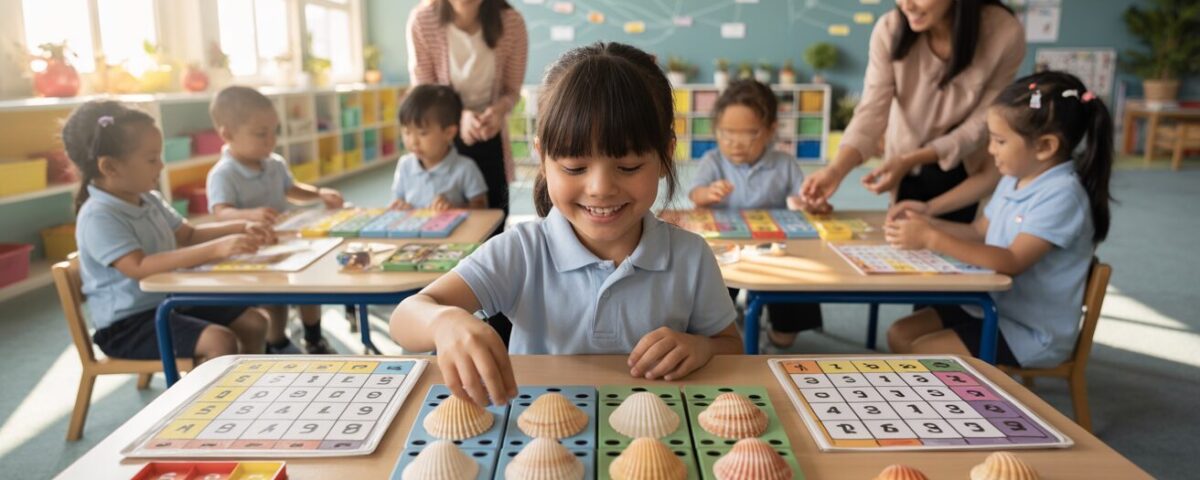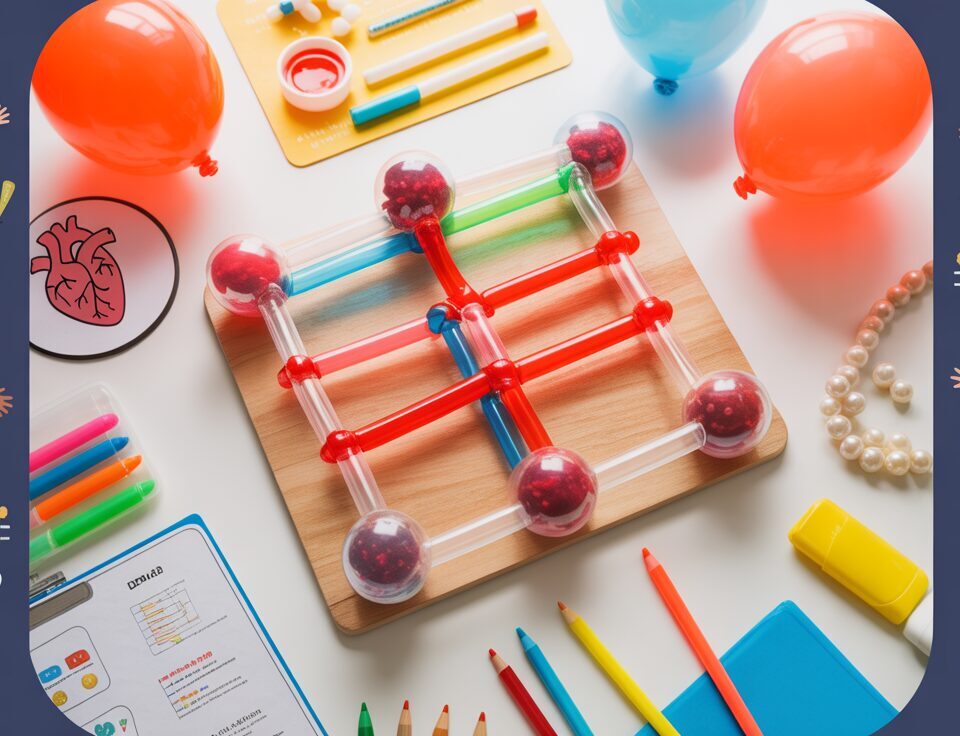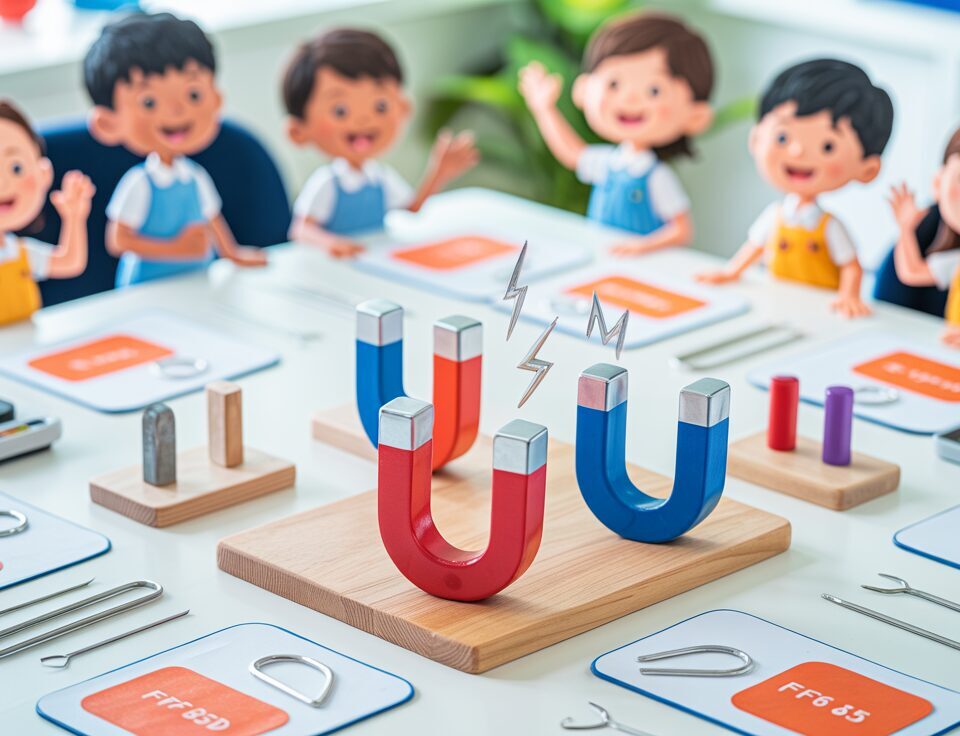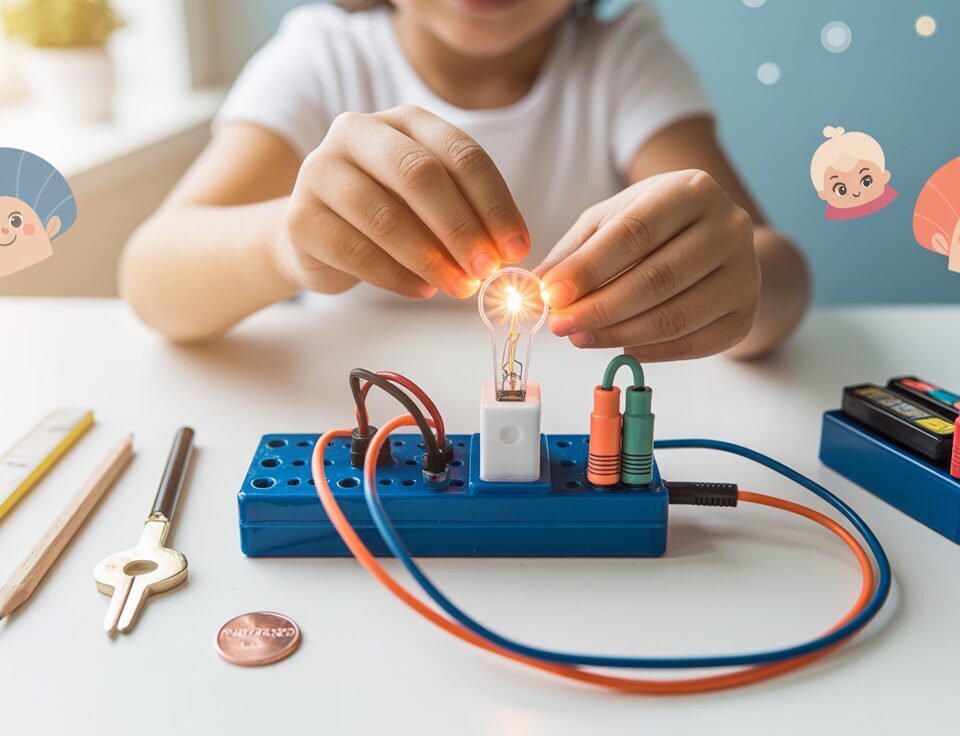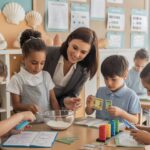
Daily Math in Real Life: How Primary Students Master Budgeting & Measurement Skills
October 14, 2025
PSLE Math Syllabus & Exam Format: A Comprehensive Guide for Parents
October 16, 2025Table Of Contents
- Understanding Multiplication in P2
- Why Games Are Effective for Teaching Multiplication
- Top Multiplication Games for P2 Students
- Free Multiplication Worksheets
- Integrating Games and Worksheets in Learning
- Tracking Your Child’s Multiplication Progress
- How Seashell Academy Approaches Multiplication
Learning multiplication tables is a significant milestone in a Primary 2 student’s mathematical journey. Yet, for many children, the traditional drill-and-practice method can feel overwhelming and uninspiring. What if your child could master multiplication facts through play and enjoyment instead?
At Seashell Academy by Suntown Education Centre, we believe that mathematics learning should nurture both academic excellence and emotional well-being. This is especially important when introducing foundational concepts like multiplication to young learners. By transforming multiplication practice into engaging games and interactive worksheets, we help students build mathematical confidence while genuinely enjoying the learning process.
In this comprehensive guide, we’ll explore why game-based learning works so effectively for teaching multiplication to P2 students. You’ll discover fun, easy-to-implement multiplication games that require minimal preparation, along with free downloadable worksheets that reinforce concepts in an engaging way. Whether you’re a parent supporting home learning or an educator looking for fresh teaching resources, these multiplication games and worksheets will help make times tables practice a highlight of your child’s day rather than a struggle.
Understanding Multiplication in P2
Primary 2 marks an important transition in a child’s mathematical development. While P1 introduced basic addition and subtraction concepts, P2 curriculum expands to include multiplication as a foundation for more complex mathematical skills.
According to Singapore’s mathematics curriculum, P2 students typically focus on:
- Understanding multiplication as repeated addition
- Visualizing multiplication through arrays and groups
- Learning multiplication facts up to 10 × 10
- Solving simple word problems involving multiplication
At this age, children are transitioning from concrete thinking to more abstract mathematical concepts. This makes it crucial to use teaching methods that bridge this gap effectively. As educators at Seashell Academy by Suntown Education Centre have observed, many P2 students grasp multiplication concepts more readily when they can visualize and physically interact with the learning material.
Children at this stage also benefit greatly from establishing strong foundational multiplication skills that will support more advanced concepts in later years. The confidence built during this crucial learning phase can shape a child’s mathematical self-concept for years to come.
Why Games Are Effective for Teaching Multiplication
When it comes to learning multiplication tables, games offer significant advantages over traditional memorization techniques. At Seashell Academy, our experience has shown that gamification transforms what might otherwise be repetitive practice into engaging learning experiences that children eagerly anticipate.
Games effectively teach multiplication for several key reasons:
- Reduced anxiety: Games create a low-pressure environment where mistakes are simply part of play, reducing the math anxiety that can hinder learning
- Increased engagement: The interactive and competitive nature of games naturally captures children’s attention and sustains their focus
- Multiple learning pathways: Games often engage visual, auditory, and kinesthetic learning simultaneously, accommodating different learning styles
- Immediate feedback: Most games provide instant feedback, allowing children to correct misconceptions immediately
- Social learning: Many multiplication games involve peers or family members, creating opportunities for collaborative learning
Research supports this approach—studies have shown that game-based learning can increase both mathematical performance and positive attitudes toward mathematics. By transforming practice into play, we help children develop fluency with multiplication facts while fostering a genuine enjoyment of mathematics.
Top Multiplication Games for P2 Students
Based on our experience at Seashell Academy by Suntown Education Centre, here are five highly effective multiplication games that are perfectly suited for Primary 2 students. Each game requires minimal materials and preparation but offers maximum engagement and learning benefits.
Dice Multiplication
Materials needed: Two dice (regular six-sided or special 10-sided dice)
How to play: This simple yet effective game requires players to roll two dice and multiply the numbers shown. For P2 students just beginning to learn multiplication, you might start with one regular die and one die showing only numbers 1-5. As they progress, two regular dice will provide practice with facts up to 6 × 6. The player correctly answers the multiplication question earns a point. The first player to reach 10 points wins.
Learning benefit: This game provides repeated practice with multiplication facts in a format that feels like play rather than work. The random nature of dice rolls ensures students practice a variety of multiplication facts rather than only the ones they find easiest.
Multiplication Bingo
Materials needed: Bingo cards with answers to multiplication problems (numbers 1-36), counters or markers, multiplication problem cards
How to play: Create bingo cards with answers to multiplication facts appropriate for P2 (products up to 100). The game leader draws and calls out multiplication problems (e.g., “3 times 4”), and players place a marker on the answer (12) if it appears on their card. The first player to complete a row, column, or diagonal pattern and shout “Bingo!” wins the game.
Learning benefit: Multiplication Bingo combines the excitement of a classic game with multiplication practice. It reinforces mental calculation skills as children must quickly compute the answers to place their markers correctly.
Skip Counting Hopscotch
Materials needed: Chalk, pavement or floor space, or masking tape for indoor use
How to play: Create a hopscotch pattern, but instead of consecutive numbers, use multiples of a specific number (e.g., 2, 4, 6, 8… for the 2 times table). Children hop through the pattern while skip counting aloud (“2, 4, 6, 8…”). For added challenge, create multiple hopscotch patterns for different multiplication tables, allowing children to practice various tables in rotation.
Learning benefit: This game connects physical movement with skip counting—the foundation of multiplication understanding. The kinesthetic element helps reinforce the patterns and sequences in multiplication tables, making them more memorable.
Multiplication Card Games
Materials needed: A standard deck of playing cards (with face cards removed)
How to play: Several card games can be adapted for multiplication practice:
Multiplication War: Deal the entire deck between two players. Each player turns over two cards simultaneously and multiplies them. The player with the higher product takes all four cards. The game continues until one player has all the cards or a set time limit expires.
Multiplication Match: Create pairs by matching a multiplication problem (e.g., 3 × 4) with its product (12). Spread all cards face down and take turns flipping two cards, trying to find matches.
Learning benefit: Card games provide extensive practice with multiplication facts in a format that feels like play. They also develop strategic thinking as children begin to recognize patterns and relationships between numbers.
Multiplication Memory Match
Materials needed: Sets of cards with multiplication problems and their answers
How to play: Create pairs of cards where one card shows a multiplication problem (e.g., 4 × 5) and another shows the answer (20). Place all cards face down. Players take turns flipping two cards, trying to match problems with their correct answers. If they make a match, they keep the cards and take another turn. If not, they flip the cards back over, and the next player takes a turn.
Learning benefit: This game strengthens memory skills alongside multiplication fluency. It also builds the association between multiplication expressions and their products, reinforcing the concept that multiplication represents a specific quantity.
Free Multiplication Worksheets
While games provide engaging practice, structured worksheets remain valuable for reinforcing multiplication concepts and tracking progress. At Seashell Academy by Suntown Education Centre, we’ve designed worksheets that maintain the fun, engaging approach of our Mathematics Programme while providing the structure needed to solidify learning.
Below are four types of free multiplication worksheets specifically designed for P2 students:
Array Visualisation Worksheets
These worksheets help students visualize multiplication through arrays, building a strong conceptual foundation. Each worksheet features:
- Visual arrays that children can count
- Spaces to write the repeated addition and multiplication sentence
- Opportunities to draw their own arrays for given multiplication facts
- Gradual progression from smaller to larger numbers
By connecting the visual representation with the abstract multiplication fact, these worksheets help children understand what multiplication actually means rather than merely memorizing facts.
Skip Counting Practice Sheets
Skip counting is a foundation for multiplication fluency. These worksheets provide structured practice with:
- Number lines with some numbers missing for children to complete
- Skip counting mazes where following the correct pattern leads to the finish
- Pattern recognition activities that reinforce the relationship between skip counting and multiplication
- Real-life contexts for skip counting (e.g., counting wheels on bicycles, legs on animals)
These activities help children internalize the patterns within each multiplication table, making it easier to recall facts quickly.
Multiplication Stories Worksheets
At Seashell Academy, we emphasize real-world applications of mathematics. These story-based worksheets:
- Present everyday situations involving multiplication
- Include engaging illustrations that children can count or analyze
- Prompt children to write both the multiplication equation and the answer
- Provide space for children to create their own multiplication stories
By connecting multiplication to real-life scenarios, these worksheets help children understand when and how to apply multiplication in everyday situations, building both comprehension and problem-solving skills.
Multiplication Games Printables
Extend the game-based learning approach with printable game boards and materials:
- Multiplication board games that can be played with dice and counters
- Printable multiplication bingo cards and calling cards
- Multiplication card game templates
- Self-checking puzzle activities that form patterns when correct answers are provided
These printables allow families to easily implement the game-based learning approach at home, reinforcing school learning in an enjoyable way.
Integrating Games and Worksheets in Learning
To maximize learning effectiveness, we recommend integrating both games and worksheets into your child’s multiplication practice routine. At Seashell Academy by Suntown Education Centre, our Programme Philosophy emphasizes balanced learning experiences that address both conceptual understanding and skill fluency.
Here’s an effective weekly structure for P2 multiplication practice:
- Day 1: Introduce new multiplication facts using array visualization worksheets
- Day 2: Reinforce through a related multiplication game
- Day 3: Practice with skip counting worksheets and activities
- Day 4: Apply learning to story problems and real-life situations
- Day 5: Review and celebrate learning through favorite games
This balanced approach ensures that children build both conceptual understanding and procedural fluency. The alternation between structured worksheets and interactive games maintains engagement while addressing different aspects of mathematical learning.
When children struggle with particular facts, return to the visual models and concrete representations before moving to abstract practice. This concrete-pictorial-abstract progression, a key element of Singapore’s mathematics approach, helps solidify understanding at each stage.
Tracking Your Child’s Multiplication Progress
Monitoring progress helps celebrate achievements and identify areas needing additional support. Create a simple tracking system using these approaches:
- Multiplication table chart: Highlight each fact as your child masters it
- Progress journal: Have your child record new facts learned and games played
- Timed challenges: Periodically offer timed worksheets to track increasing fluency
- Self-assessment: Encourage children to rate their confidence with different multiplication tables
Remember that progress in mathematics isn’t always linear. Some children might quickly master the 2 and 5 times tables but need more time with 7s or 8s. This is completely normal and should be approached with patience rather than pressure.
At Seashell Academy, we believe in celebrating effort as much as achievement. When tracking progress, acknowledge the persistence and strategic thinking your child demonstrates, not just correct answers. This builds the growth mindset and resilience that are vital for long-term mathematical success.
How Seashell Academy Approaches Multiplication
At Seashell Academy by Suntown Education Centre, our approach to teaching multiplication exemplifies our broader educational philosophy. Our unique Seashell Method integrates academic excellence with emotional well-being, ensuring students build both skills and confidence.
When teaching multiplication to P2 students, we emphasize:
- Conceptual understanding: We ensure students grasp what multiplication means before focusing on memorization
- Visual learning: Through our mind-mapping approaches, we help students visualize number relationships
- Gamified practice: Our interactive lessons transform repetitive practice into engaging challenges
- Real-world application: We connect multiplication to everyday scenarios students can relate to
- Emotional support: We create a safe learning environment where mistakes are viewed as growth opportunities
Our experienced MOE-trained educators lead small classes that allow for personalized attention to each student’s learning needs. This ensures that all students develop strong multiplication skills at their own pace, without the pressure that can lead to math anxiety.
Parents often note that their children’s attitude toward mathematics transforms after joining our Mathematics Programme. What once seemed like tedious practice becomes an enjoyable challenge as children experience success and build confidence through our supportive approach.
For students who struggle with particular aspects of multiplication, we provide targeted support through our structured learning plans, addressing specific misconceptions and building from areas of strength. This personalized approach ensures that all students develop the strong foundation in multiplication that will support their future mathematical learning.
Conclusion: Making Multiplication Meaningful and Fun
Learning multiplication facts is an essential milestone in your child’s mathematical journey, but it doesn’t have to be a source of stress or tedium. By incorporating games and engaging worksheets into your child’s practice routine, you transform multiplication from a memorization task into an enjoyable learning adventure.
The games and worksheets we’ve shared reflect the same principles that guide our teaching at Seashell Academy by Suntown Education Centre—blending conceptual understanding with enjoyable practice, and balancing academic rigor with emotional well-being. This approach helps children develop not just multiplication fluency, but also a positive relationship with mathematics that will serve them throughout their academic journey.
Remember that each child learns at their own pace. Some may quickly grasp multiplication concepts, while others may need more time and varied approaches. By maintaining a playful, patient attitude and celebrating progress along the way, you help your child build both mathematical skills and learning confidence.
As your child continues their mathematical journey, these early positive experiences with multiplication will form the foundation for more advanced concepts. The confidence, problem-solving skills, and mathematical thinking developed through these games and activities extend far beyond simple multiplication facts—they’re building blocks for future mathematical success.
Ready to Transform Your Child’s Mathematics Experience?
At Seashell Academy by Suntown Education Centre, we specialize in making mathematics engaging, meaningful, and enjoyable for Primary 1-6 students. Our small-group classes provide the perfect balance of personalized attention and peer learning, all guided by our unique Seashell Method.
Contact us today to learn more about our Mathematics Programme or to schedule a consultation with one of our experienced educators.
Get in touch now to begin your child’s journey toward mathematical confidence and success!


